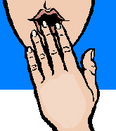HECK YEAH! Call Me Niggardly!
 I am a worrier.
I am a worrier.My children are right up there on my worry scale for no other reason then they are my children. I worry about my husband's health. He's fine, thank you very much. I worry about locking the front door until I worry about having my keys just in case I actually did lock the front door. Today, I am worried about words: how we use them and how we don't when we should and how we are becoming lazy wordsmiths.
Recently, the use of the word niggardly caused outrage. It was, according to a group of citizens, offensive. Now, I have come to accept that people use the word offensive at the drop of a hat these days, but I burned some mental rubber on that one. The word niggardly has nothing to do with race even though its true meaning is exquisitely insulting.
Niggardly - adjective
1. reluctant to give or spend; stingy; miserly.
2. meanly or ungenerously small or scanty: a niggardly tip to a waiter.
Scrooge was niggardly. Yes, you may call me niggardly although I prefer the word frugal. It was this example – and the fact that a reader wrote to me and said she had to use a dictionary three times while reading one of my books - that caused me to worry that we are losing appreciation for the richness and the nuances of our language, the specificity that has evolved over hundreds and hundreds of years. My heart breaks that we have come to accept the simple, the mundane, the expedient and the bastardized when it comes to how we communicate.*
Perhaps I sound arrogant – worrying about such a lofty thing as language when I am far from being a master of it. I treasure a dictionary (not to be confused with spell-check) when I run across a written word I am unfamiliar with. I jot a note when I hear a speaker use a term foreign to me. I am disheartened when I hear school children mimicking movie sound effects instead of finding an adjective or adverb to express themselves. For years I have been using the word laconic inappropriately. To my utter shame, I found it means to be concise, not lazy. At least I came to my senses, sought out the truth and mended my slovenly** literary ways.
As an author, I know that each word is critical to the construction of a sentence, each sentence to the paragraph and each paragraph to the story as a whole. I believe the poet understands this better than the novelist. The poet works with severe restrictions of form. Novelists, are free to flail around, herding thousands of words into a corral that holds hundreds of pages. The novelist views her book as the Grand Canyon, huge and multi-dimensional; the poet's work is a trail of perfectly placed pebbles.
I lament that I, like many writers, often forget that pebbles are critically important. If my words are chosen properly, the end result of all my creative hours will be a seamless, beautiful work of craggy depths and satisfying vistas. If I settle for any old words, I will have nothing but a pile of boulders, rocks and mud balls rising to no great height.
So, to the end of becoming a better writer I promise:
I will be neither lazy nor overly ambitious with my word choices.
I will be expand my craft by collecting and understanding new words.
I will choose a word because it is appropriate; not because it is impressive or expedient.
I will understand each word I use.
I will use words like paints to shade, to build, to brighten, to foreshadow.
I will edit my work more than once, changing out words until I write exactly what I want to convey to the reader.
To become a better reader I promise:
I will seek out, support and appreciate the writer who has done all of the above.
To become a better person I promise:
I will strive to pay attention to each word I read, speak or hear so that I will always appreciate and understand what is trying to be communicated.
I feel so much better. On to worrying about something more important - like the niggardly portion of chicken wings I just picked up for lunch.
*I include myself here.
**adjective - lazily slipshod
Published on May 03, 2011 15:20
No comments have been added yet.



